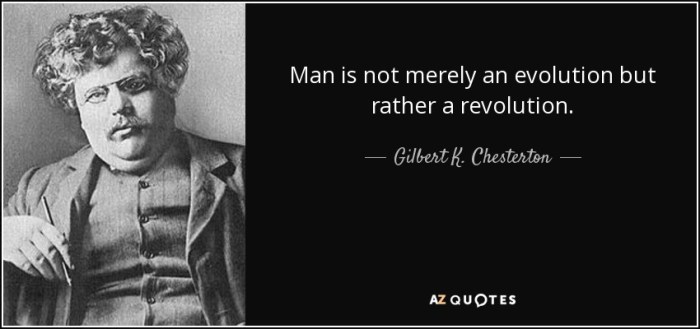Its evolution not revolution gentlemen meaning – The quote “Its evolution, not revolution, gentlemen” emerged during the Victorian era, encapsulating the prevailing attitudes towards social and political change. This phrase became a guiding principle for understanding the gradual transformation of society, influenced by Darwin’s theory of evolution and shaping societal norms and expectations.
The Victorian era witnessed significant social and economic changes, leading to debates on the pace and nature of societal progress. The quote “Its evolution, not revolution, gentlemen” reflected the belief that societal change should occur through gradual and incremental reforms rather than radical transformations.
Historical Context: Its Evolution Not Revolution Gentlemen Meaning

The quote “It’s evolution, not revolution, gentlemen” emerged during the Victorian era, a period marked by significant social and political changes. The prevailing attitudes of the time emphasized stability, order, and gradual progress, shaping the interpretation of this quote.
The quote reflected the belief that societal transformation should occur through incremental reforms rather than radical upheaval. It served as a caution against revolutionary movements that sought to overturn established norms and structures.
Examples of the quote’s influence include the gradual expansion of suffrage, the rise of the middle class, and the development of social welfare programs, all of which represented gradual societal changes within the existing political and economic system.
Darwinian Influence
The advent of Darwin’s theory of evolution had a profound impact on the understanding of the quote “evolution, not revolution.” Darwin’s concept of gradual change over time through natural selection resonated with the idea of societal progress through incremental reforms.
The quote became associated with the notion that societal transformation should mirror the slow and steady processes of nature, rather than abrupt and violent revolutions. This interpretation emphasized the importance of patience, adaptation, and the gradual accumulation of knowledge and experience.
Applications in Different Fields, Its evolution not revolution gentlemen meaning
The quote “evolution, not revolution” has been applied to a wide range of fields, each with its own unique interpretation and adaptation:
- Politics:The quote has been used to justify both gradual reforms and resistance to radical change. It has guided political decision-making, emphasizing the need for incremental progress and consensus-building.
- Economics:In economics, the quote has been used to argue for market-driven gradualism, rather than government-imposed radical changes. It has influenced policies that prioritize economic growth through innovation and technological advancements.
- Technology:In the field of technology, the quote has been applied to the development and adoption of new technologies. It has emphasized the importance of iterative improvements, research and development, and the gradual diffusion of new technologies.
Modern Relevance
The quote “evolution, not revolution” remains relevant in contemporary society, where the debate between gradual change and radical transformation continues:
- Social Change:The quote is used in discussions on social issues, emphasizing the need for gradual reforms to address complex problems, such as inequality, climate change, and social justice.
- Political Discourse:In political discourse, the quote is used to advocate for incremental policy changes, rather than radical shifts in ideology or governance. It serves as a reminder of the potential risks and complexities of revolutionary movements.
- Technological Disruption:The quote is also applied to the impact of technological advancements. It emphasizes the need to manage technological change in a way that minimizes disruption and allows for adaptation and innovation.
Essential FAQs
What is the significance of the quote “Its evolution, not revolution, gentlemen”?
The quote encapsulates the Victorian belief that societal change should occur through gradual and incremental reforms rather than radical transformations.
How did Darwin’s theory of evolution influence the interpretation of this quote?
Darwin’s theory of gradual change over time supported the idea that societal progress should occur through incremental steps rather than sudden revolutions.
In what ways has the quote been applied to different fields?
The quote has been applied to various fields, including politics, economics, and technology, guiding decision-making and influencing policies.


